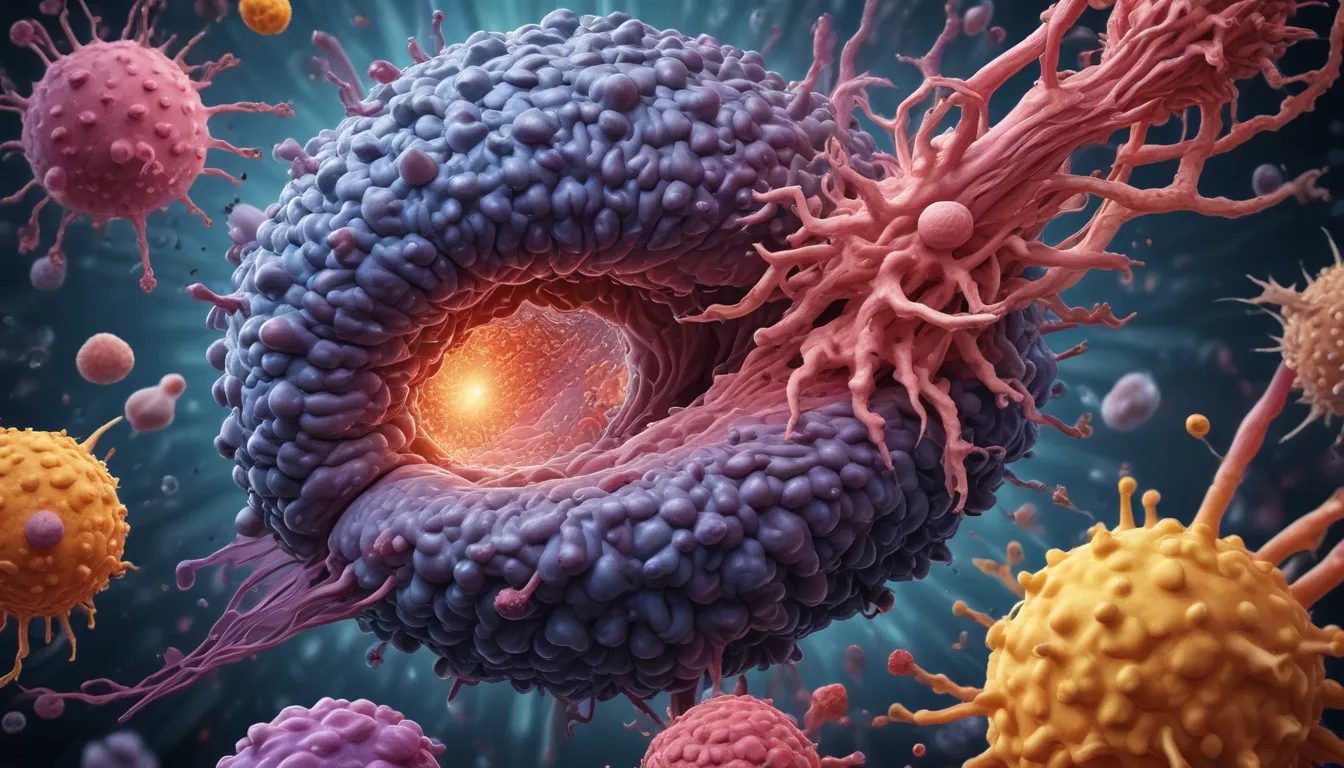A Note About Images: The images used in our articles are for illustration purposes only and may not exactly match the content. They are meant to engage readers, but the text should be relied upon for accurate information.
The landscape of cancer treatment has undergone a remarkable transformation in recent years, thanks to the introduction of immune checkpoint inhibitors. These groundbreaking pharmaceutical agents have captured the attention of the medical world by offering a new avenue of hope for patients grappling with various forms of cancer.
These inhibitors function by tapping into the body’s immune system to combat cancer cells effectively. By targeting specific proteins known as checkpoint molecules, they disrupt the immune system’s regulation, enabling it to launch a more potent attack against cancer cells. In this article, we will embark on a journey to uncover 18 fascinating facts about immune checkpoint inhibitors, ranging from their mechanism of action to their remarkable efficacy in reshaping the fight against cancer.
Unveiling the Immune Checkpoint Inhibitors Revolution
Immune checkpoint inhibitors stand as a revolutionary class of drugs that have transformed the realm of cancer treatment. These medications work by activating the body’s innate immune system to identify and eliminate cancer cells, paving the way for a novel approach to combating cancer.
Targeting the Checkpoints Governing Immune Response
Immune checkpoint inhibitors zero in on specific proteins referred to as checkpoints on immune cells. These checkpoints serve a pivotal role in regulating the immune response, ensuring that the immune system does not unleash excessive attacks on healthy cells and tissues.
Key Players: PD-1 and CTLA-4
Two crucial immune checkpoints, programmed cell death protein 1 (PD-1) and cytotoxic T lymphocyte-associated antigen 4 (CTLA-4), are targeted by inhibitors. By obstructing these checkpoints, the inhibitors unleash the immune system’s potential to identify and obliterate cancer cells with greater efficiency.
Unveiling Impressive Success Rates of Immune Checkpoint Inhibitors
Extensive studies have demonstrated that immune checkpoint inhibitors boast remarkable success rates, with certain patients experiencing enduring remissions. These treatments have exhibited exceptional efficacy in combating melanoma, lung cancer, and kidney cancer among other malignancies.
Paving the Way to a Durable Response
Diverging from conventional cancer treatments that offer transient relief, immune checkpoint inhibitors can trigger a durable response in specific patients. This indicates that the cancer remains under control even after the conclusion of treatment.
Enhancing Efficacy Through Combination Therapies
Researchers have unearthed that merging immune checkpoint inhibitors with other anti-cancer therapies like chemotherapy or targeted therapy can amplify their efficacy. These amalgamated treatments hold the promise of significantly enhancing patient outcomes.
Navigating Immune-Related Adverse Events
While immune checkpoint inhibitors hold great promise, they can also precipitate immune-related adverse events (irAEs). These events encompass organ inflammations, skin rashes, thyroid dysfunction, and potentially severe immune reactions. Close monitoring is imperative to effectively manage these side effects.
Guidance Through Biomarkers
Discerning specific biomarkers in patients can aid in determining their suitability for immune checkpoint inhibitor therapy. Biomarkers such as PD-L1 expression or tumor mutational burden can serve as indicators of the likelihood of a positive treatment response.
Shedding Light on Their Limitations
Though immune checkpoint inhibitors have showcased efficacy in treating various cancers, they do not exhibit uniform effectiveness across all types. Certain cancers like prostate cancer and pancreatic cancer have demonstrated limited responses to these therapies.
Embracing a Future of Increased Access
As the body of evidence endorsing the effectiveness of immune checkpoint inhibitors continues to expand, access to these medications is proliferating worldwide. More countries are authorizing their use and facilitating their availability to patients.
Unveiling the Potential for Long-Term Survival
Several patients treated with immune checkpoint inhibitors have witnessed substantial spikes in overall survival rates. In specific instances, these therapies have metamorphosed advanced-stage cancers into treatable, manageable chronic conditions.
Navigating the Challenge of Affordability
One impediment hindering the widespread adoption of immune checkpoint inhibitors lies in their steep costs. These therapies can prove financially burdensome, rendering access challenging for many patients. Diligent efforts are underway to tackle this quandary and improve affordability.
Charting New Avenues Through Ongoing Research
Researchers persist in delving into novel immune checkpoints and formulating inhibitors to target them. The aspiration is to broaden the spectrum of treatable cancers and elevate outcomes for patients.
Promising Horizons With Combination Therapies
Exploratory studies are in progress to evaluate the potential of immune checkpoint inhibitors in conjunction with other immunotherapies like CAR-T cell therapy or cancer vaccines. These collaborative approaches harbor the potential of further enhancing treatment effectiveness.
Inducing Immune Memory
Immune checkpoint inhibitors possess the unique capacity to instigate immune memory, signifying that the immune system can identify and remember cancer cells. This holds the promise of delivering long-term protection against cancer recurrence.
Illuminating Promise in Pediatric Cancers
Early investigations have unveiled promising outcomes for immune checkpoint inhibitors in pediatric cancer treatment. These interventions proffer newfound hope for children previously grappling with limited therapeutic options.
Extending Beyond Cancer Treatment
Beyond their prowess in treating cancer, immune checkpoint inhibitors are under scrutiny for their potential applications in other domains like autoimmune disorders and chronic infections. The realm of immunotherapy continues to burgeon.
Redefining the Medical Landscape
The emergence of immune checkpoint inhibitors delineates a paradigm shift in cancer treatment, redefining our approach to combating this disease. These groundbreaking therapies are setting the stage for more targeted, efficacious treatments in the days to come.
In essence, immune checkpoint inhibitors epitomize a game-changer in the realm of cancer treatment, proffering hope and enhancing long-term outcomes for myriad patients. The 18 captivating insights into immune checkpoint inhibitors detailed above underscore the noteworthy strides made in this domain and the promise these therapies hold for the future of medicine.
Navigating the Future
Immune checkpoint inhibitors have revolutionized cancer treatment by harnessing the immune system’s power to combat cancer cells effectively. These drugs have demonstrated remarkable success across various cancer types, offering renewed hope and improved prognoses.
By releasing the brakes on the immune system, immune checkpoint inhibitors facilitate the body’s natural defense mechanisms to zero in on and annihilate cancer cells efficiently. With their potential to induce enduring effects and trigger durable remissions, these inhibitors represent a beacon of hope for cancer patients worldwide.
As research unfolds, scientists are exploring novel targets, combination therapies, and delivery methods for immune checkpoint inhibitors. This burgeoning field holds immense promise for the future of cancer therapy, paving the way for personalized, refined treatments that promise to revolutionize cancer care for years to come.
FAQs
1. What are immune checkpoint inhibitors?
Immune checkpoint inhibitors are a class of cancer treatments that activate the immune system to recognize and destroy cancer cells by targeting specific proteins on cancer cells or immune cells.
2. How do immune checkpoint inhibitors work?
These inhibitors block the checkpoints that regulate the immune response, enabling immune cells to identify and eliminate cancer cells effectively. By unleashing the brakes on the immune system, they enhance the body’s ability to combat cancer.
3. What types of cancer can immune checkpoint inhibitors treat?
Immune checkpoint inhibitors have demonstrated substantial success in treating a diverse array of cancers, including melanoma, lung cancer, bladder cancer, kidney cancer, and numerous others. Ongoing research aims to expand their applications to additional cancer types.
4. What are the side effects of immune checkpoint inhibitors?
While immune checkpoint inhibitors have proven effective, they can evoke side effects, ranging from mild to severe. Common side effects include fatigue, skin rash, diarrhea, and flu-like symptoms. Severe side effects may impact the liver, lungs, intestines, or other organs, necessitating vigilant monitoring by healthcare professionals.
5. Are immune checkpoint inhibitors a cure for cancer?
Immune checkpoint inhibitors have showcased promising outcomes and markedly improved results for many cancer patients. However, they may not constitute a cure for every cancer type. An array of factors, encompassing cancer stage and type, overall health, and individual response, can influence treatment effectiveness.
6. Are immune checkpoint inhibitors accessible to all patients?
While regulatory authorities have endorsed immune checkpoint inhibitors for select cancer types, their administration may hinge on factors like the patient’s specific diagnosis, cancer stage, and overall condition. Decisions pertaining to treatment options should be undertaken in consultation with healthcare providers.
Immune checkpoint inhibitors have ushered in a new era in cancer treatment, proffering hope to countless individuals worldwide. These pioneering therapies leverage the immune system’s potential to tackle cancer cells, yielding impressive success rates and enduring responses. As research delves into novel targets and combination therapies, the sphere of immune checkpoint inhibitors transcends beyond cancer treatment, envisioning a radically transformed medical landscape. For those seeking further insights on cutting-edge cancer treatments, our companion article “8 Facts You Must Know About Oncology Drugs” unveils essential perspectives on the realm of oncology pharmaceuticals.
This revised article on immune checkpoint inhibitors aims to provide a comprehensive and insightful overview of these innovative cancer treatments. By delving into their mechanisms, successes, challenges, and future prospects, readers are equipped with a deeper understanding of the transformative impact of immune checkpoint inhibitors in cancer care.






